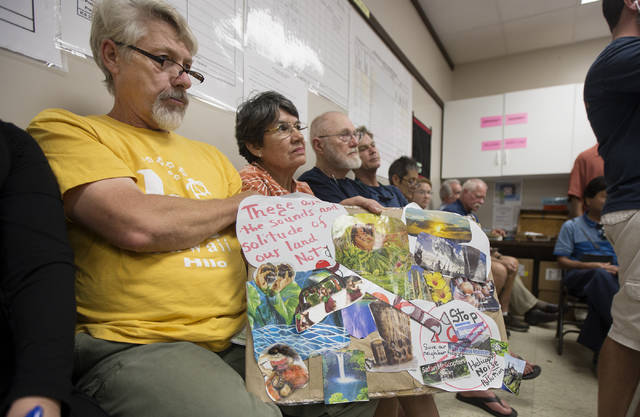Should tourism helicopters fly only over the ocean instead of neighborhoods to decrease their noise? Or will that endanger lives — and the tourism industry? ADVERTISING Should tourism helicopters fly only over the ocean instead of neighborhoods to decrease their
Should tourism helicopters fly only over the ocean instead of neighborhoods to decrease their noise? Or will that endanger lives — and the tourism industry?
Those questions might appear far removed from the seemingly simple process of helicopters getting permission to park at the Hilo International Airport. It’s something they’ve done for a long time.
But the parking permit is on the agenda for today’s Board of Land and Natural Resources meeting in Honolulu. The board meets at 9 a.m.
A community group known as Hawaii Island Coalition Malama Pono, or HICoP (www.hicop.org), plans to request a contested case hearing about a parking permit at Hilo International Airport for Kailua-Kona-based Paradise Helicopters, formerly K&S Helicopters Inc.
“HICoP has met with the tour helicopter operators on Hawaii Island and shown them extensive video coverage of their helicopters overflying our homes and told them in explicit detail how their continuing operations impact our quality of life, our health and the noise nuisance their tour helicopters cause depriving us of the use and enjoyment of our property,” said HICoP President and board member Bob Ernst in an email.
Ernst said during an interview Thursday that the organization wants all tour helicopter companies to be required to fly directly over water from both major Big Island airports, including the Ellison Onizuka Kona International Airport at Keahole in Kailua-Kona, because that’s the only way the noise can be eliminated.
“It can interrupt your telephone calls, it can interrupt your sleep, it can interrupt your nap. It interrupts your life — it just becomes your life,” he said.
Ernst said he’s not sure how many active members HICoP has, but it sends emails to “hundreds” of people who signed up to get them.
Ernst said HICoP took the step of requesting the contested case hearing so the airport parking permit might be denied because the Federal Aviation Administration controls air traffic, leaving the organization searching for help from the state. Ernst said he thinks the parking permit request is intended to add a helicopter or helicopters to already congested flights on the Big Island.
However, Troy Scott, acquisition division chief and a pilot for Paradise Helicopters, said his company requested the parking permit only because the Hilo airport wanted to build a new access road going through one of Paradise Helicopters’ existing spots (Pad 1). To do that, the airport requested Paradise give up Pad 1 and request a permit for a new spot (Pad 11).
He said there currently are no plans for new helicopters.
Noise is a complex issue that the helicopter tourism industry has addressed in many ways throughout the years, Scott said.
Although helicopter tourism is a for-profit industry, tour providers operate on a thin margin, he said. Flying over the ocean would add time to the flight path between Hilo and the lava ocean entry. And, in the helicopter tourism industry, time in the air equates to more money for fuel and fewer tours with less money coming in as a result.
In addition, Scott said, the FAA requires helicopters that fly over water to be capable of coasting to land if an engine fails. Most tour helicopters on the Big Island have only a single engine, Scott said. That means tour companies would need to buy dual-engine helicopters, which cost more to operate, or flotation equipment.
If the FAA was to require tour companies to fly only over the ocean, Scott said, “some operators may have to go out of business.”
“Our firm alone, we employ over 100 families on the Big Island,” he said.
Cost of the additional flight time would be borne by customers, he said, and that likely would leave some current customers unable to afford the flights.
But Ernst said there were 15,489 flights over Hawaii Volcanoes National Park in 2016 and the DLNR should hold the contested case hearing and block the helicopter parking permit.
“We see it as the only viable solution to bring serenity back to Hawaii Island,” Ernst said.
Other issues under consideration during the state Board of Land and Natural Resources meeting today include:
• A request to extend a West Hawaii land lease for an additional 35 years for the Food Basket, Hawaii Island’s food bank. The nonprofit has a warehouse on the land in question where it collects and distributes food.
• Administrative enforcement for violation of administrative rules against Samuel Perez Hults “for engaging in illegal commercial activity on state lands and in state waters adjacent to Kailua Beach Park,” with a possible fine of $11,000.
Email Jeff Hansel at jhansel@hawaiitribune-herald.com.



